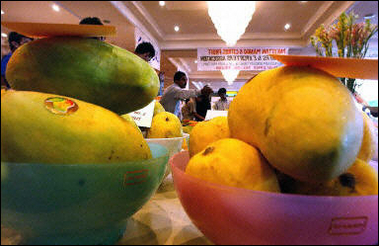|
Pakistan set for early free trade benefits from China, Malaysia
(AP)
Updated: 2005-11-30 15:04
Pakistan will derive early tariff concessions from China
and Malaysia as it conducts free trade negotiations with them and other Asian
economies, Commerce Minister Humayun Akhtar Khan said.

Pakistan will
derive early tariff concessions from China and Malaysia as it conducts
free trade negotiations with them and other Asian economies.
[AFP] |
Khan, who is on a visit to the United States, told reporters that he would
travel to Beijing and Kuala Lumpur in December to "operationalize the early
harvest" program.
The initial tariff concessions from China would cover "almost everything
which Pakistan is exporting right now, including textiles, apparel sports goods,
surgical instruments and fisheries," he said here on Tuesday.
"For some items, the concessions are immediate and in two years they will
come down to zero, depending on where the tariffs are right now," Khan said.
Pakistan would also offer to China import tariff cuts on primarily machinery
and raw materials as well as fruits and vegetables, he said.
"Pakistan has a very active FTA (free trade agreement) policy right now in
the region and outside," he said, adding that his country was preparing for
competition by deregulating and liberalizing its trade regime.
"Pakistan's imports are rising faster than exports, consuming machinery and
raw materials, which is a good sign for the economy. We cannot have a major jump
on exports without liberalizing our imports," he said.
"Because of our reforms, we are bold enough to go ahead and take this leap,"
he said of the free trade moves, particularly with China "which is a huge market
and can help improve the competitivess of our industry."
In its own backyard in South Asia, Pakistan together with India, Bangladesh,
Bhutan, Nepal, Sri Lanka and Maldives are aiming to forge a regionwide free
trade area, slated to be operationalized from January 1, 2006.
But Khan said it could face a "few months" delay as Bangladesh had "some
unresolved issues over compensation" due to loss of tariff revenue.
Pakistan has also signed an agreement called Economic Cooperation
Organization with six central Asian states, including Iran and Turkey.
With Iran, which has high tariff and non tariff barriers, Pakistan had signed
a bilateral trade deal to keep a smooth trade flow, Khan said.
Pakistan, which already has an operating FTA with Sri Lanka, was negotiating
similar pacts with Bangladesh and Nepal as well as Singapore.
Khan said Pakistan wanted to strike individual free trade pacts with key
Southeast Asian nations as it strived to become a full dialogue partner with the
10-member Association of Southeast Asian Nations (ASEAN).
ASEAN comprises Brunei, Cambodia, Indonesia, Laos, Malaysia, Myanmar, the
Philippines, Singapore, Thailand and Vietnam.
Pakistan has a comprehensive economic partnership pact with Indonesia to
boost investment and trade among the two largest Muslim nations.
Islamabad also wants to forge a free trade pact with the United States but it
has to first sign a so-called bilateral investment treaty with its top trading
partner.
Khan and United States Trade Representative (USTR) Rob Portman agreed in
Washington Tuesday to strive harder to forge the pact, USTR spokeswoman Neena
Moorjani told AFP after their talks.
She said the treaty "can play an important role in strengthening Pakistans
economy which creates new opportunities for exporters and investors in both
economies as well as bolster our joint efforts on terrorism."
Pakistan President General Pervez Musharraf, who seized power in a bloodless
coup in 1999, is a key US ally in its "war on terror" and has repeatedly spoken
out against extremism in the Muslim world.
Khan said a possible visit by President George W. Bush to Pakistan next year
could provide an impetus for signing the bilateral investment
treaty.
|